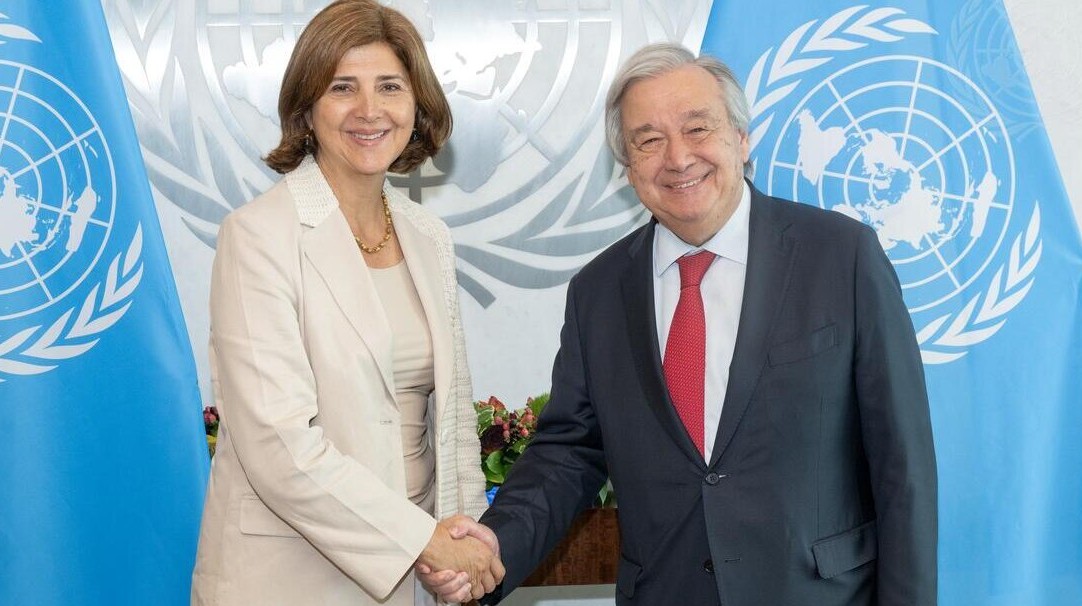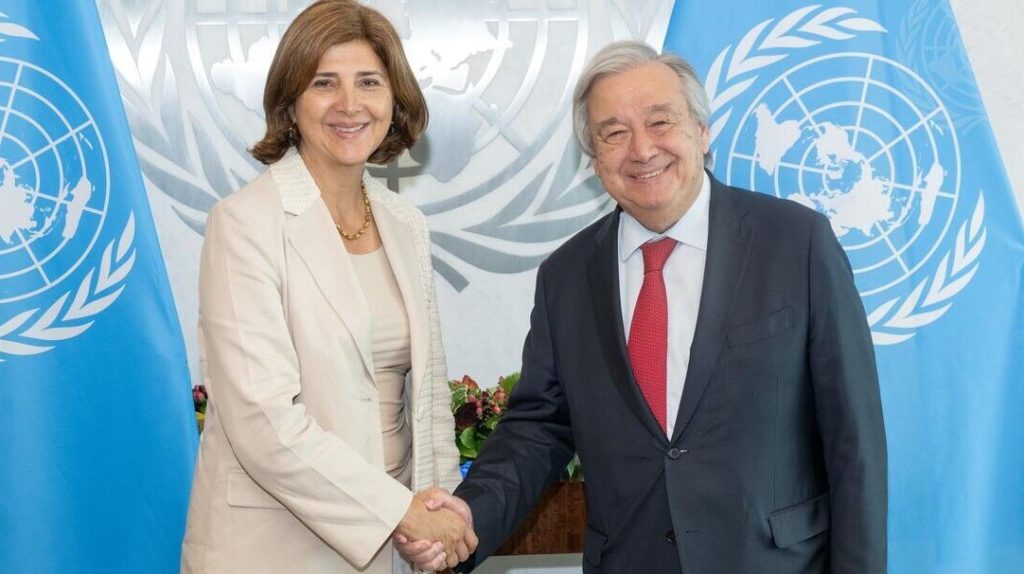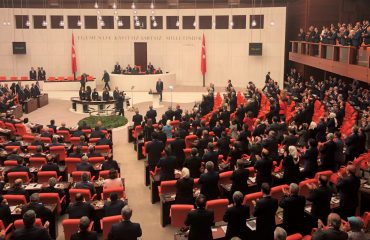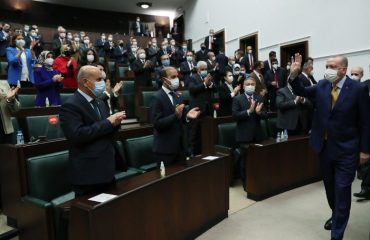

A solution in Cyprus is possible based on the equality of two sovereign constituent states, with limited but functional joint institutions and security guarantees. Otherwise, instead of a solution, new areas of tension will be created. UN Secretary General Guterres (R) and his Cyprus Envoy Cuéllar. (Photo: UN)
The Cyprus issue has remained stuck in conceptual traps for decades, unable to move beyond being a diplomatic headline. Concepts such as “two-zone, two-community federation,” “two sovereign states,” and “confederation” have become not the solution itself but the terminological cloak of the lack of a solution. Today, the issue is no longer “how to name it” but “what can work.”
In this context, the expanded informal 5+1 summit to be held in New York on July 16–17, 2025, could be the first step toward a functional coexistence architecture based on institutions rather than concepts. But this will only be possible with a realistic, mutually acceptable, and balanced structural design.
On July 14, the United Nations Security Council will hold its regular six-monthly consultation meeting to discuss the situation in Cyprus. Cyprus Special Representative Colin Stewart is expected to provide information in a closed session. The meeting will address current developments in the Cyprus issue and evaluate the UN’s peace and resolution efforts in Cyprus.
Enough with concepts, time for realities
In particular, following the informal Cyprus meetings held in Geneva in March 2025 under the auspices of UN Secretary-General Antonio Guterres, the Secretary-General’s Special Representative for Cyprus, María Ángela Holguín Cuéllar, continues to seek common ground for the transition to a formal negotiation process between the parties. She will once again be in contact with both sides on the island in the coming days ahead of the July meeting. However, differences of opinion persist, and obstacles remain to the commencement of formal negotiations.
The federal solution model for Cyprus has been put on the table many times, but it was effectively buried in Crans-Montana. The “two-state solution” proposal, while accepted by the Turkish side, did not find political support in the international community. At this point, progress can be made not by imposing one of these two models, but by seeking a functional partnership that allows the parties to coexist.
Sovereignty-based, limited authority partnership
At the core of this new approach lies the necessity to preserve sovereignty, limit areas of partnership, institutionalize political equality, and ensure security in concrete terms.
The increasingly clear diplomatic framework highlights a model in which sovereignty elements will remain with the two founding states, but joint authority and representation will be established only in specific and limited areas (such as foreign policy, defense, EU relations, and federal taxation).
This structure is neither a traditional federation nor a model of two separate states. Rather, a loose confederal structure similar to the Swiss model could provide a balance that would work on a multi-ethnic, multi-layered island such as Cyprus.
Swiss-style presidential council for Cyprus
At the heart of this new structure is a proposal for a five-member presidential council:
• The council will consist of three Greek Cypriot and two Turkish Cypriot members;
• Members will rotate their positions every six months;
• Decisions will be made by consensus or a defined qualified majority (with at least one member from each state voting in favor);
• This structure will institutionally guarantee permanent representation and political equality between the parties.
This proposal aligns with both the Turkish Cypriot side’s and Türkiye’s understanding of a solution based on sovereign equality, as well as the Greek Cypriot side’s ideal of a two-zone, two-community federal solution. In this way, conceptual polarizations are overcome while the legitimate sensitivities of the parties are preserved.
A balanced partnership, not asymmetrical rights
One of the most critical issues in terms of the functionality of this structure is Türkiye’s position and rights. Türkiye is not a member of the European Union; however, within the framework of the solution, it must have an equal sphere of influence with Greece, which is a member of the EU. This equality should not be limited to political representation but should also be clearly defined in terms of economic and legal rights.
In particular, Turkish citizens must have equal rights with Greek citizens, limited to Cyprus, in three fundamental areas of freedom: the free movement of capital and people, settlement, and property acquisition.
In this context:
• A special external relations mechanism should be established for EU relations.
• Türkiye’s participation in the processes should be guaranteed not only as a candidate country but also as a founding partner in the solution;
• Otherwise, the asymmetric order that will emerge against Türkiye could undermine not only Ankara’s mutual trust but also that of the two founding states and their peoples in the future.
An excluded Türkiye risks the sustainability of the solution; a balanced and equal Türkiye is the guarantor of the stability of the process.
Security: Guarantees on the ground, not on paper
Security is the issue that carries the most historical burden and trauma in the Cyprus issue. Based on past experiences, the Turkish side focuses on a deterrence mechanism that is applicable and sustainable on the ground, rather than guarantees on paper.
In this context:
• The 1960 Guarantee Agreement should be updated, but not completely abolished;
• Following the example of the UK’s sovereign bases on the island, Türkiye should be allocated a limited base area that includes land, air, and sea elements, is open to sovereign use, and has a specified number of personnel;
• This base should be structured to provide both symbolic and practical deterrence and should be consistent with the principles of mutual control and transparency.
Such a security arrangement would serve as a guarantee for the Turkish side that the traumas of the 1963–74 period will not be repeated, and as a balancing factor for the Greek Cypriot side that uncontrolled military expansion will be limited.
Schengen risk: From the Green Line to a hard border?
The Greek Cypriot administration’s goal of full membership in the Schengen Area within the European Union could be a development that further entrenches the de facto division of the island. The current Green Line could become an external border in such a scenario:
• Crossings become more difficult;
• Trade, social contact, and daily life would be disrupted;
• Symbolically, one of the last remaining channels of cooperation on the island would be severed.
Therefore:
• A special transition protocol should be established with the participation of both sides and the UN before the Schengen process;
• The status of the Green Line should be redefined within the framework of Schengen applications;
• The European Union should act through multilateral diplomacy, not unilateral action.
Institutions that work should be built, not maps
The solution in Cyprus is no longer a matter of drawing a border; it is a matter of building a shared life. The foundation of this shared life is a structure where sovereignty is preserved, institutional cooperation is defined, security is tied to concrete guarantees, and equality is ensured not only in words but also in practice.
This structure:
• Addresses the Turkish side’s demand for sovereign equality,
• Allows room for the Greek Cypriot side’s ideal of a unified structure,
• Provides an applicable, monitorable, and sustainable solution architecture for the international community.
Most importantly, this structure does not offer the parties new concepts, but a new system of mutual trust. In Cyprus, a solution should no longer be measured by its name, but by how viable its content is.


